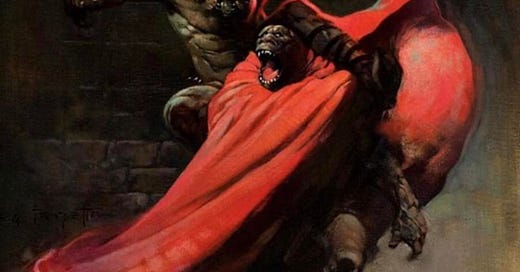Robert E. Howard’s Conan has been called many things since his arrival in the Weird Tales magazine in 1933: Conan the Cimmerian, Conan the Barbarian, Conan the Conqueror, Conan the Avenger, Conan the Buccaneer, etc. But as I was reading the Patrice Louinet’s introduction to the illustrated collection of REH’s original Conan stories, I discovered yet another title for the archetypal king of sword & sorcery: Conan the Philosopher.
In the intro, Louinet singles out the quotation below from the short story, “Queen of the Black Coast”, as “the philosophy of Conan”, and in it we find a pretty cool little anti-skeptical argument:
In this world men struggle and suffer vainly, finding pleasure only in the bright madness of battle… let me live deep while I live; let me know the rich juices of red meat and stinging wine on my palate, the hot embrace of white arms, the mad exultation of battle when the blue blades flame and crimson, and I am content. Let teachers and priests and philosophers brood over questions of reality and illusion. I know this: if life is illusion, then I am no less an illusion, and being thus, the illusion is real to me. I live, I burn with life, I love, I slay, and am content.
Did you catch it? Conan is in the midst of propounding his pragmatic “live the life of the warrior to the fullest” philosophy of life, and he gives a quick little argument justifying why he doesn’t spend time worrying too much about skeptical questions in metaphysics (the study of the nature of reality). If we reformulate the thrust of the argument, we might take him to be arguing something like this:
(i) If reality is wholly illusory, then I would be an illusion too
(ii) But I am not an illusion, I have qualitative experiences
therefore,
(iii) Reality is not wholly illusory.
This arg. is similar to Descartes’s cogito ergo sum dictum—roughly, the fact that I’m thinking presupposes that I exist, so I exist even when I’m doubting my existence—as well as Augustine’s si fallor sum argument, i.e., I can’t be mistaken about my existence because I must exist in order to be mistaken (yes, Descartes jacked it from Augustine).
But Conan’s line of reasoning may be a bit subtler than the two above, I think he goes full pragmatist but ends up in a commonsense realism. If we expand out his thought process, it might go like this:
Say everything is an illusion. If that’s the case, then I am an illusion as well, because I am some-thing and every-thing is an illusion. But as an illusion myself, this illusory world is real to me. I still eat and drink, love and slay, I thrive in this illusory world. So, if I’m an illusion living in an illusory world, thriving just the same as I would if my world were not an illusion and I were not an illusory being, then what’s the difference? There is none. So, what’s left of the concept of ‘illusion’ if everything is an illusion? Nothing. In that case, we’ve emptied ‘illusion’ of its meaning. If everything is an illusion, then nothing is. So, then there’s no difference between a wholly illusory world and the real world. So, I live in the real world, even if we want to call it an ‘illusion’.
Now would Conan fully get behind my interpretation of him? I’m not sure, I think the whole point of his pragmatic aphorism is that it’s meant to be apprehended more immediately, like the punchline of a joke, rather than explained like I tried to do. I think that with most good aphorisms there’s a tacit knowledge that we gain when we apprehend it’s meaning but which resists full elucidation. Once again that old ancient Fremen saying is relevant here, “Truth suffers from too much analysis.”
Exegeting Conan is a dangerous business, but I thought his wise saying was worth sharing so you could contemplate it as well—even if it earns me a cleft in my skull.






Great essay, I quite liked this one. Conan as a philosophical character is a point that most don't know about due to the 'Arnold movie' of the 80s with most forgetting that even that character has his moments of deep thought. So that this sort of essay is direly needed to clear up the fog of confusion that looms over the character.
Great essay mon ami!
Love it Lyle!